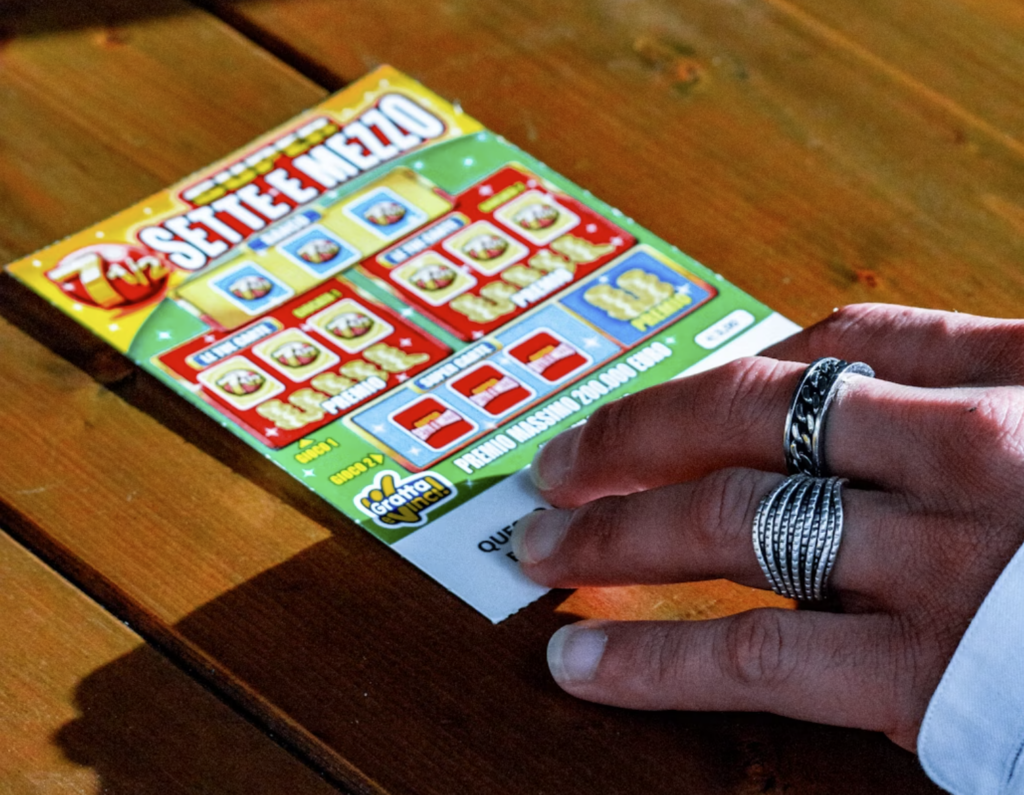In 2015, Marie Holmes, a struggling single mother, defied the odds and won $188 million in the North Carolina Powerball lottery. With such a massive fortune, the possibilities seemed endless—luxury homes, fancy cars, even private jets.
However, winning wasn’t the fairytale she expected. Soon after her big win, her life took a dramatic turn for the worse as people around her sought to take advantage.

A Deserving Winner
At 26, Holmes was a single mom working two jobs—at McDonald’s and Walmart—to support her four kids. Her life had recently become even more difficult when one of her children was diagnosed with cerebral palsy, forcing her to quit both jobs. Financial struggles weighed heavily on her, and she dreamed of a better life for her children.

A Life-Changing Moment
In February 2015, Holmes spent a few dollars on a Powerball ticket at a local gas station. When she returned home to her trailer, she discovered she was one of the lucky winners. Despite sharing the jackpot with two others, her portion came to an astounding $188 million.

The Process of Winning
While most people have won small lottery amounts like $50 or $100, claiming a huge prize like Holmes’ required a complex process. She had to verify the ticket, wait for funds to be disbursed, and then decide whether to take a lump sum or receive the money over 30 years.

A Millionaire’s Dilemma
Holmes had the option to take either the full $188 million over time or a reduced lump sum of $127 million. Financial experts often recommend the lump sum because investing it can generate greater long-term returns than the payments spread over decades. Holmes, like many winners, chose the lump sum.

Uncle Sam’s Cut
From her $127 million lump sum, taxes took a huge bite. North Carolina’s state tax rate on lottery winnings was 5.8%, while federal taxes took at least 25%, potentially up to 39.6%. In total, Holmes may have paid around $50 million in taxes.

Noble Intentions
Holmes planned to use her winnings wisely. She vowed to donate to her church, move her family into a proper home, and set up college funds for her children. “All the struggle was for them,” she told NBC, emphasizing that money wouldn’t change her, but it could help improve their lives.
A Cautionary Tale
Holmes was known for her humility and work ethic. Her friends and family believed she would remain grounded, despite her newfound wealth. However, even those with the best intentions can face unexpected challenges when thrust into a life of immense fortune.
Trouble on the Horizon
Lottery winners, especially those unaccustomed to handling vast sums of money, often need more financial guidance than established millionaires. Poor investment choices and reckless spending can make even a massive fortune disappear.
Holmes faced her first questionable decision when she bailed out her boyfriend, LaMar McDow, who had been arrested. She also bought him a $15,000 diamond-encrusted Rolex. What seemed like a minor expense was just the beginning of financial troubles.
Holmes’ story serves as a reminder that winning the lottery can bring as many challenges as it does opportunities.

Bail and Frivolous Spending
Marie Holmes’ extravagant spending began when she purchased a $15,000 diamond-encrusted Rolex for her boyfriend, LaMar McDow. Though this seemed like a small fraction of her fortune, it marked the beginning of much larger financial issues. McDow, who had just $100 in his account before being jailed in 2014, now had a partner capable of bailing him out at any cost.
McDow refuted claims that Holmes had spent $21 million to bail him out, stating, “People keep saying she paid $21 million to get me out of jail, but that’s not true. It was only 10 percent.”
A New Home
Before his arrest, McDow lived with Holmes and her four children in their trailer. Once released, he moved into a $350,000 home that Holmes purchased after her lottery win, according to the Daily Mail. The article also revealed that after taxes, Holmes received $88 million from her lump sum—far less than the original $188 million jackpot. For someone transitioning from poverty to wealth, $88 million was still an incredible amount of money, but losing $100 million made a significant difference.

Requests for Money
As expected, once Holmes’ lottery win became public, friends, family, and even distant acquaintances came forward asking for loans or handouts. What’s $10,000 to a good friend? A new home for a generous aunt? The couple was bombarded with requests, even from those with good intentions. McDow would often field these calls, and Holmes would remind him, “When money comes, there are more problems.” She couldn’t have been more right.

Wrong Neighborhood
After winning the lottery, Holmes and McDow, both persons of color, moved into an expensive home in a predominantly white, affluent neighborhood. Unfortunately, they faced constant harassment from their neighbors, both subtle and overt. McDow recounted an incident where a neighbor set up a camera to monitor their every move, telling Daily Mail, “If I drove the speed limit, they’d still wave me down for going too fast. They didn’t want us there. They were prejudiced.”

Giving Back to the Church
Holmes’ church, Pleasant Hill Missionary Baptist, had been a spiritual refuge for her since childhood. Deeply committed to her faith, Holmes pledged to donate 10%, or a tithe, of her winnings to charity. Had her winnings remained anonymous, perhaps fewer people would have tried to take advantage of her generosity. But in North Carolina, state law mandates that the names of lottery winners be publicly disclosed.
Holmes followed through on her promise, starting with a $700,000 donation to her church. The funds were used for much-needed repairs.

A Pastor’s Agenda
A pastor named Kevin Mathews, who had no previous connection to Holmes or her church, became involved with her and her family after their lottery win. Claiming that “God led him to them,” he gained their trust, offering ministerial guidance and advice to McDow.
Mathews eventually asked Holmes for $1.5 million to help build a religious retreat, asserting that she had verbally agreed to the donation, although nothing was in writing. He proceeded with the construction using his own money.

A Lawsuit from the Pastor
Mathews later sued Holmes for $10 million, claiming emotional distress and mental anguish. Despite the retreat only costing $1.5 million, he sought a much larger amount. While his case was weak due to the lack of a written agreement, Mathews alleged that the situation had caused him such anxiety and depression that he required additional medication.
Lessons Learned
The likelihood of winning the lottery twice is slim, so it’s crucial to be cautious, as even millions of dollars can disappear quickly. Beyond the large amount taken by taxes, unpaid debts can also deplete your winnings faster than you’d expect.
Moreover, anticipate being approached by family, friends, and even strangers seeking financial help. It’s wise not to flaunt your wealth and maintain a low profile when offering assistance to others.
Next up, read about this homeless man and his discovery
A Homeless Man Discovers His True Identity at 67
The following story may seem unbelievable or miraculous, but every word is true. It recounts how a man went from being homeless for three decades to reconnecting with his family, revealing an identity no one, including him, could have imagined.

Early Life
Born in 1950, the man was put up for adoption when he was just two years old. A family from San Leandro, California, took him in.
In school, he was an average student and participated in his high school’s marching band. However, he never formed a strong connection with his adoptive family and struggled to bond with his siblings. Although his foster mother offered him support, their relationship alone wasn’t enough to keep him grounded. As a result, he had difficulty holding a job and barely made ends meet.

On His Own
After a few years, both of his adoptive parents passed away. His siblings, who never truly accepted him, severed all ties, and the extended family followed suit. With no family to rely on, he also lost contact with his childhood friends in San Leandro, leaving him completely isolated.
The Downfall
The man found work as a truck driver, and for a while, his life seemed steady. However, a life-altering car accident left him disabled. He was unable to drive and spent over a year confined to a wheelchair before transitioning to crutches.
Struggling with Disability
Due to his injury, finding work became a constant struggle. Jobs that required physical labor, like those in the manufacturing, food industries, or even at the DMV, were beyond his capability because of his disability. He couldn’t lift heavy objects, stand for long periods, or even drive. Eventually, he lost all of his jobs, and his life began to unravel.

Hitting Rock Bottom
Meet Mike Myers, a man who, by 2017, had lived the majority of his adult life homeless. With no job or family, he ended up on the streets, relying on playing guitar and panhandling to survive. At the age of 67, he had lost all hope of a better life and had forgotten the details of his past.
Unfortunately, Mike Myers’ story is not unique. California is home to 25% of the nation’s homeless population. In 2017, the Federal Department of Housing and Urban Development estimated that there were over 554,000 homeless people in the U.S.
But Myers’ fate was about to take a turn when he met someone who would change his life.

A Life-Changing Encounter
To survive, Myers often played his guitar and begged by the freeway. Alameda County Deputy Sheriff Jacob Swalwell regularly encountered Myers, issuing him warnings to stop his activities. Little did either of them know, their relationship would soon take a pivotal turn.

Their First Real Conversation
Although the two had crossed paths many times before, they never had a substantial conversation until one day when Swalwell decided to issue Myers a citation. Myers, however, didn’t have any form of identification. This prompted Swalwell to ask him more questions, leading to a deeper conversation about Myers’ life.
Myers recounted his early years and explained how his life had taken such a tragic turn, leaving him homeless and without support.
Swalwell empathized with Myers, pointing out that an elderly man like him shouldn’t be living on the streets. Unfortunately, without an ID, Myers couldn’t qualify for social security or any government aid.

A Guardian Angel Appears
Realizing the dire situation Myers was in, Swalwell promised to do everything he could to help. Myers, overwhelmed by the officer’s compassion, was immensely grateful for the chance to get back on his feet.
Though Myers had grown accustomed to the harshness of life on the streets, the kindness and dedication of one stranger would set him on a path toward reclaiming his identity and dignity.

The Mission Begins
Swalwell embarked on a mission to uncover Myers’ past. He started by contacting the DMV, hoping to find Myers’ records since Myers had worked there before. However, the records had been deleted, leaving them at a dead end.
He realized that to get Myers a government ID, he would need a birth certificate and proof of California residency. But Swalwell posed the question, “How can he prove residency when he’s homeless?” Despite this, he was determined not to give up.
New Allies
Swalwell enlisted help from his pastor and colleagues at the Alameda County Sheriff’s Department. Together, they managed to establish proof of residency and track down Myers’ birth certificate. Armed with these documents, they returned to the DMV, and within a month of their initial meeting, Myers finally had his ID.
A Stunning Revelation
During the process, Swalwell made a discovery that would alter Myers’ life. Myers wasn’t born with the name Mick Myers—his real name was Gordon Michael Oakley. This revelation left Myers in shock as he had no idea.
The Story Goes Public
The story of Swalwell’s efforts and the unlikely friendship between the two was picked up by a local news station. The segment aired, hoping to raise awareness and attract more help.
It worked. A private investigator named Mark Askins saw the broadcast and offered his assistance.

Mark Askins Steps In
Mark Askins, a seasoned investigator, reached out to Swalwell and Myers. Having worked with a charity called “Miracle Message,” which helps reunite homeless individuals with their families, Askins was well-equipped to take on the case. His involvement filled Myers with a renewed sense of hope.
The Obstacles
Like many homeless individuals, Myers had been disconnected from his family for years due to circumstances such as mental health struggles, a lack of access to technology, and the shame of his situation. These factors made it incredibly difficult for people like him to reconnect with loved ones.
In Myers’ case, his homelessness meant he had no access to the internet or modern communication tools. At his age, keeping up with technological advancements was nearly impossible, making the prospect of finding his family seem unattainable.

The Investigation Begins
With just a birth certificate and some basic information, Askins began his investigation. He had to rely on courthouse records to gather more details.
Although modern birth records are easily accessible, the 1950s were a different time. Since the records weren’t digitized, Askins and his team had to comb through stacks of physical documents, making the search slow and difficult.

A Breakthrough
After a long search, Askins discovered a case file belonging to a woman named Marie Pauline Oakley. Marie was married to Wiley Albert Oakley, and together they had a child named Gordon Michael Oakley—now known as Mick Myers.
Unfortunately, Marie and Wiley’s marriage ended in divorce a few years later. While Wiley had passed away, Askins continued to dig, determined to find out why Marie had given her son up for adoption.

Locating Marie
Finding Marie was no easy task. She had a common name, and due to her age, there was a possibility that she might no longer be alive. However, Askins eventually found a woman by the same name living in California. Though it was a long shot, he decided to reach out.
A Surprising Discovery
When Askins called, he was astonished to learn that 85-year-old Marie Pauline Oakley was not only alive but living just a few miles away. She had since gone by her middle name, Pauline.
Answers Revealed
After speaking with Pauline, Askins arranged for a meeting. She was surprised to learn that her son had survived and was curious about his life.
Pauline explained that when he was born, he had a serious medical condition—a hole in his stomach—that required expensive treatment. As a single mother, she couldn’t afford the care he needed, so she made the heartbreaking decision to put him up for adoption, hoping another family could provide a better life.

Reconnection
Baby Myers was adopted by a church-affiliated family that was financially stable. Though Pauline had reservations, she believed it was the best choice for her son. However, she had never stopped thinking about him, wondering if he had survived and what his life had been like.

First Contact in 60 Years
With Askins’ help, Myers and Pauline were able to reconnect for the first time in over six decades. But this was only the beginning.
Meeting Face-to-Face
A few weeks later, Myers, along with Swalwell and Askins, flew out to meet Pauline. Though Myers didn’t remember her, and she was essentially a stranger to him, he was excited to meet his birth mother.
Family Reunion
Upon their arrival, they were greeted by Myers’ niece, Shannon, who drove them to Pauline’s home. Myers was surprised to learn he even had a niece. When they reached the house, Myers and his mother finally reunited. They embraced at the door, both overwhelmed with emotion. Neither had expected to see each other again after all these years.

Sharing Memories
The two spent hours catching up. Pauline pulled out an old photo album filled with pictures of Myers and his siblings, recounting many cherished memories. Myers shared stories of his life with his adoptive family, explaining how things had taken a turn for the worse over time.
A Mother’s Regret
Pauline was devastated to hear about the hardships her son had faced. For years, she had comforted herself with the belief that he was living a better life. Learning the truth—that he had suffered instead—broke her heart.
Speaking to KPIX-5, she said, “It saddens me deeply to know what he went through, especially when I think about all the experiences his siblings had, all the advantages they enjoyed, while he suffered.”

Embracing a New Family
Myers had long given up hope of ever having a family again. After three decades of homelessness, it seemed like an unattainable dream. But now, he found himself surrounded by his mother, brothers, sisters, and even grand-nieces and nephews who were eager to get to know him.
Shortly after reuniting, Myers moved in with his mother, and his extended family visited him regularly. Thanks to Swalwell’s efforts, he also received health coverage and social security benefits.

A Happy Ending
If it weren’t for Deputy Swalwell’s determination and the support of his team, Myers might never have found his family. Pauline expressed her eternal gratitude, jokingly asking Swalwell to turn around. When he did, she said she was looking for his wings because he was the angel that had brought her son back to her.
Pauline’s heart was whole again, and Myers finally had a place to call home. He no longer had to wander or wonder—he was right where he belonged.
